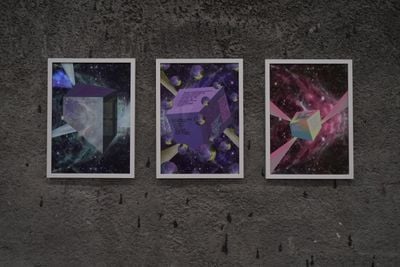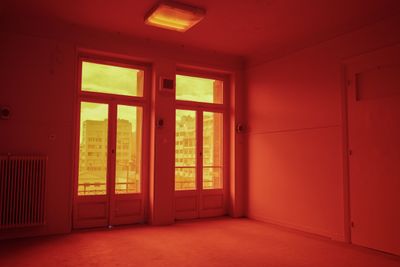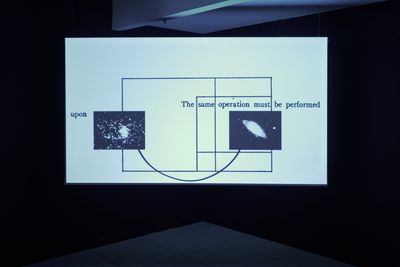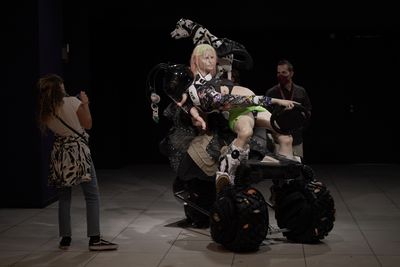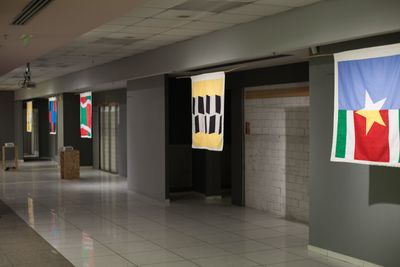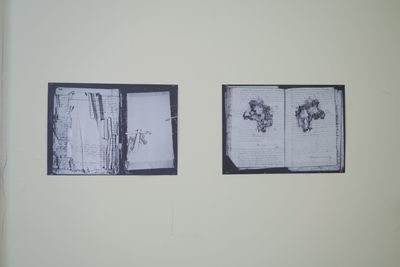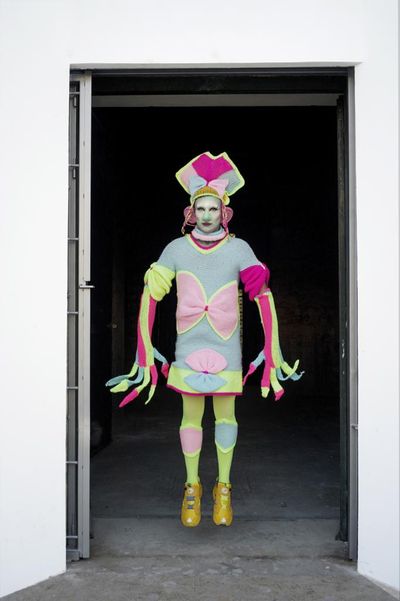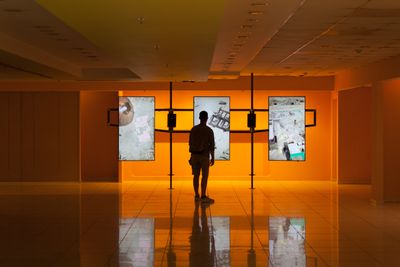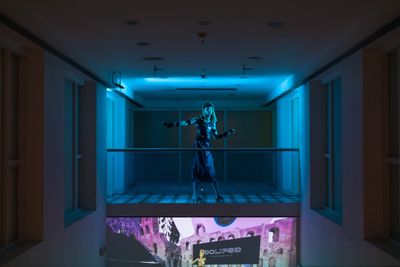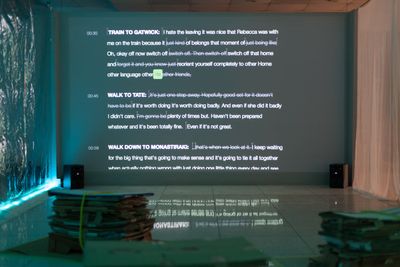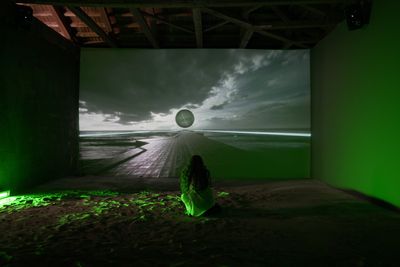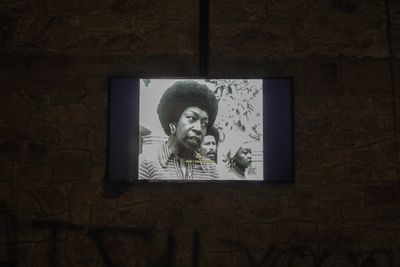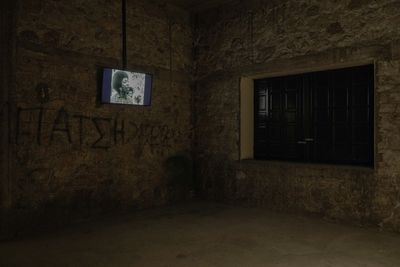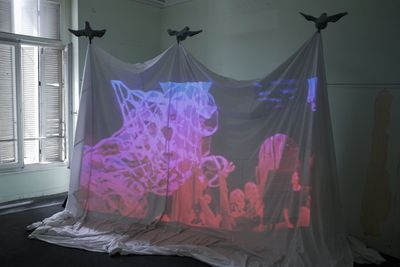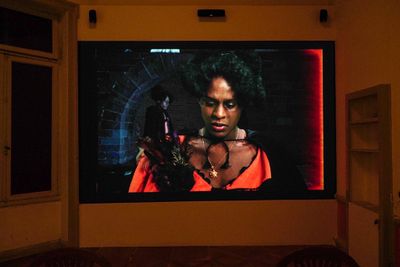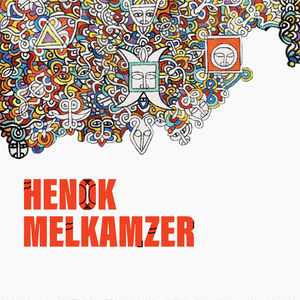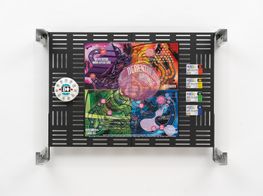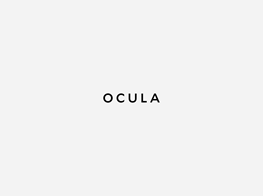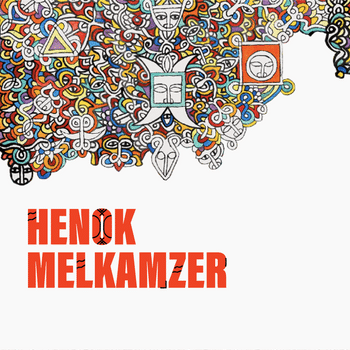Athens Biennale Queers the Mainstream
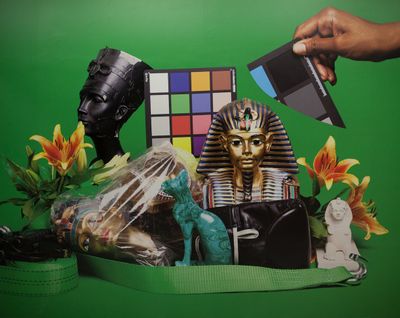
Awol Erizku, Asiatic Lilies (2017). Digital photograph. Digital print on vinyl sticker. Dimensions variable. Exhibition view: 7th Athens Biennale, ECLIPSE, Athens (24 September–28 November 2021). Courtesy Athens Biennale. Photo: Emilios Haralambous.
Not one to embrace the New Ageism apparently popular in art today, nor do I inhabit the virtual realm beyond keeping in touch with news and friends, the techno-awakening evangelised by ECLIPSE, the 7th Athens Biennale (24 September–28 November 2021), is difficult to cross.
Co-curated by Berlin-based artist group Omsk Social Club, which have used methods of Live Action Role Play to create fictional realities, and Ghanaian-American curator and cultural critic Larry Ossei-Mensah, ECLIPSE asks if the West is in decline or in a moment of significant transformation.
Over 400 works by more than 80 artists, a majority of whom are Berlin or U.S.-based, are spread across three empty venues in downtown Athens: the former Department Store Fokas, with its fading pastel colours and mirrors; the former Santaroza Courthouse at Justice Square, whose name offers added symbolism to a Biennale that always excels at slogans; and the neo-baroque Schliemann-Mela Hall, with 'We are moving' notes still stuck on office doors.
These buildings, all examples of Athens' rich architectural landscape, await potential investors as buyers continue to press the city's residents out of the centre.
But for now, they serve to express the aesthetics of capitalist decay that crises-weary Athenians are very much aware of, in an exhibition that employs 'immersive techniques'—such as real game play, 'emotional hypnosis', and visualisation—to create the conditions for transformative experiences.
Wandering the deserted eight levels of the Fokas Department Store, however, I was more drawn to Simon Denny's exposure of neo-imperialist strategies in data collection, labour, and gamification in Caterpillar Biometric worker fatigue monitoring smartband Extractor pop display (2019), than in finding my inner self in the escape room environment of The Living Necrologue (2021), created by Omsk Social Club along with Jonas Schoeneberg and Happy New Tears.
Denny's installation includes a giant cardboard CAT smartband, which monitors the sleep patterns of construction and mining labourers to determine how likely an accident might occur, and a Monopoly-like board game that enlists players as for-profit data miners.
While viewers are made to feel like pawns in Denny's game, which is playable on specific dates guided by a game master, participants in The Living Necrologue can choose what meditative paths to take in an escape room environment consisting of custom-made tarot cards, music scores by Happy New Tears, ambient lighting, and written instructions on how to orient themselves in the installation.
The quest to decipher codes runs through ECLIPSE. Visually impressive silicon-made central-pieces, such as Cajsa Von Zeipel's hybrid hyper-woman sculptures (Formula X, 2021 and Catch and Kill, 2020) or Andrew Roberts' sculptures of limbs tattooed with brand logos like Nike, are shocking in enrapturing the hysterias of capitalist existence, yet banal in their ultra-realist, iconographic nature.
On the other hand, Samson Kambalu's more difficult to classify 'Nyau Cinema' series (2016)—black and white short videos documenting playful and poetic performative gestures—and imaginary flags including The Country Drowning in Unhealthy Nationalism (2019) and Impossible Country (2019), challenge notions of identity by creating unclassifiable representations that bridge references from Kambalu's native Malawi and the Western avantgarde.
The intention to queer and creolise dominant narratives is the most interesting part of ECLIPSE. At once charged by Black perspectives and artistic practices in the wake of 2020, and the struggles of a queer art scene that in Athens, though not represented in the exhibition, contracted after LGBTQ activist Zak Kostopoulos was killed in 2017 from a civilian and police beating not far from the Biennale venues.
For A Zombie Reader for the Seventh Athens Biennale: ECLIPSE (2021), manuel arturo abreu shares teaching notes from their collective home school in Portland, part of an ongoing process of experimental education against the commodification of criticality.
Printed leaflets and a video projection trace the origins of the zombie trope during U.S. occupation of Haiti (1915–1934) and its continuity with European fears of a Black rebel contagion in the wake of the Haitian Revolution (1791–1804).
A para-educational model based on solidarity and empathy is proposed by dragtivist Taka Taka. Their three-hour performance Mothers Mothering Mothers (2021) consists of a drag workshop that looks at the history of drag performance, its debt to Black culture, and the activist role of House of Hopelezz, a drag space in Amsterdam that fights against the discrimination of sex workers.
Nevertheless, queering the mainstream canon, which aligns with the mission to promote inclusion among canonical art institutions like Athens Biennale partner Onassis Cultural Centre, feels hijacked by an overload of over 400 works in this show.
...ECLIPSE has a specific feeling of déjà vu, at least from an Athenian perspective: like being trapped in a dystopian theme park.
Of course, there are eye-catching videos and arresting V.R. environments. Like Theo Triantafyllidis' infinite duration live simulation installation Ritual (2020), a real-time apocalyptic scenario where different animal and machine characters with their own primitive artificial intelligence are left in the California desert to interact with the environment and themselves. But the problem is there are too many.
It is true that technologies of the imagination like augmented reality enable new worlds and challenge dominant stereotypes. As seen in the V.R. choreography of Afro-Hungarian trans-fem artist Janos Huntrezz's Eclipsatrix Exuvia (2021), where a non-binary Sufi-like avatar dances fluidly in endless transformation: a cyber-escapist utopia where Victor Orbán's Trump-like politics are nowhere to be found.
But cyberspace is not free from historical class and gender antagonisms, and it remains to be seen how the relentless instrumentalisation of the techno-virtual realm might be resisted.
As if in reflection, Erica Scourti's single-channel video installation Exit Scripts (2018) projects script produced by a computer programme detecting the emotions behind the artist's self-therapeutic monologues recorded on the phone, a tool to endure a difficult period of her life. Here, the trust in affect meets the problematisation of surveillance, keeping in mind how entangled representation is with technological and therefore corporate mediation.
Questions of instrumentalisation and capitalisation constitute the elephant in the room for the Athens Biennale. Since its inception, the institution has created a dominant aesthetic characterised by iconoclastic works set in deserted venues representing bankrupt utopias, which may soon transform into luxury hotels and New-Age malls with vegan delights and meditation sessions.
As such, while most of the artists haven't exhibited in Greece before, ECLIPSE has a feeling of déjà vu, at least from an Athenian perspective: like being trapped in a dystopian theme park.
At times, works feel pressed to be perceived in a certain way rather than given air to breathe. Though this was not the case at the former Santaroza Courthouse, where I couldn't stop watching video documentation of Afro-Peruvian artist and activist Victoria Santa Cruz, co-founder of Cumanana, the first Black theatre company in Peru, shout: '¡Negra! Si. ¡Negra! Soy. ¡Negra! Negra.' ('Black! Yes, Black. I am. Black! Black.')
Part of Me gritaron negra (They Shouted Back at Me, 1978), this powerful performance narrates the artist's claiming of her Blackness, and feels grounded in a broader feminist methodology that draws on embodied, lived experience to communicate critical points and ideas.
For all its virtuality, ECLIPSE requires effort when it comes to seeking out transformative moments I.R.L.; an effort that is perhaps summed up in Steve McQueen's video End Credits (2012–ongoing), the only work on show in the Onassis Cultural Centre.
In this moving homage to singer and social activist Paul Robeson, targeted by the FBI because of his crusade against lynching, thousands of scrolling pages representing the now partly declassified files on Robeson can be read as a timeless call for emancipation.
End Credits could also be read as a point of departure, to rethink the role of art and its ability to reach audiences in complex times, where modes of surveillance and representation are at once becoming increasingly controlled, obfuscated, and ever-expansive. It takes time to find ways out of gridlock, whether spiritual or political; a reality encapsulated by the distraction of the endless scroll. ECLIPSE does not quite manage to find a way through.
Despite its urgent exploration of the technological present, ECLIPSE largely fails to contend with the political stakes of the technologically defined times. Among them, the recent surge of interest in occult histories and forms in relation to the intertwining of religion, nationalist rhetoric, and online conspiracy theories behind many of the ultra-conservative turns across Europe and the United States.
While the previous Athens Biennale, ANTI, was simplistically criticised for adopting extremist views by looking at this very trend through works by artists researching such dark entanglements, ECLIPSE abandons the pursuit completely. The result is an 'emotional hypnosis' that hijacks the emancipatory and critical nature of many of the works on view.
Take the emergence of the political role of magic in the history of Black culture, present in Black transgender artist-activist Tourmaline's short film Salacia (2019), an atmospheric homage to a prosecuted 1820s trans figure labelled a 'man-monster'.
A penetrating study on the right to self-making, works like these need space and time for audiences to connect with the alternative dimensions and perspectives on the power of spirituality—and its relation to solidarity—that they open up. —[O]

